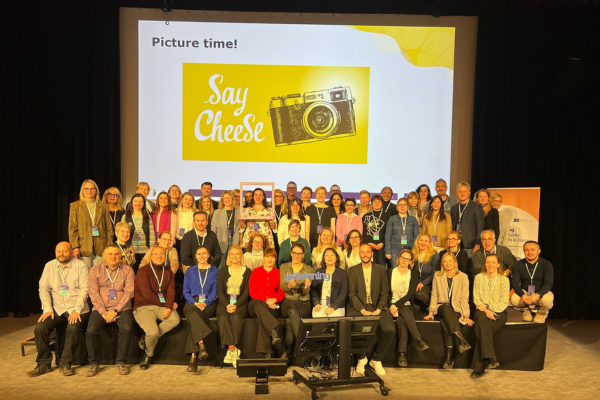
eTwinning workshop on citizenship education

Secondary and initial vocational education and training (IVET) teachers met in Helsinki from 20 to 22 March for the eTwinning workshop, Engage, inspire, empower: Citizenship education through eTwinning.
Through hands-on workshops, keynotes and networking opportunities, they explored strategies to make citizenship education part of their school’s curriculum.
Day 1
The event opened with a keynote speech by Daria Arlavi, a seconded national expert in the Directorate-General for Education, Youth, Sport and Culture at the European Commission, entitled ‘Strengthening citizenship education for a more inclusive and engaged society’. She spoke about how citizenship education can encourage pupils to take part in democracy and help build inclusive and diverse communities.
‘Traditionally, citizenship education has focused on teaching about civic institutions, voting and national rights and responsibilities. However, in today’s interconnected world, its scope must extend beyond borders.
Young people need to be aware of and responsive to global issues, understand their role as global citizens and recognise their ability to make a difference.’’
— Daria Arlavi
Nina Penttinen, Counsellor of Education at the Finnish National Agency for Education, delivered a keynote speech on how ‘Citizenship education strengthens democracy and societal resilience’. She shared valuable insights into how schools can help pupils become active citizens and critical thinkers.
‘An inclusive human rights-based and democratic culture lays the foundation for students to become active citizens’
— Nina Penttinen
Day 2
The second day was dedicated to workshops, including
- Empowering schools for active citizenship and supporting teachers in this role
- Understanding the link between sustainable development and inclusive global citizenship
- Making future education more inclusive and accessible
- Integrating environmental citizenship into eTwinning projects
- Exploring ways to teach democracy in the classroom
Day 3
On the final day, participants shared project ideas and action plans they had developed together to promote citizenship education in their schools. Such as ‘Building bridges beyond barriers’, ‘Instagreen: Influencers of tomorrow’, ‘The TruthFeed’ and ‘C.A.R.E (civic action for resilient engagement)’.
The session continued with a presentation from Tuija Kae, a senior English teacher, deputy head teacher and international coordinator at Sotunki Upper Secondary School and Distance Learning Centre in Vantaa, Finland.
She presented ‘Our Europe’, a Jean Monnet learning initiative that helps pupils understand European cultural and historical heritage, highlighting
- a lecture series in which teachers are featured experts, as well as academic guests
- visits to EU institutions in cities such as Brussels or Luxembourg
- how the school’s drama group brings European culture to life by adapting, rehearsing and performing a different European play each year
‘Through theatre, pupils learn perseverance and taking responsibility, because they are collectively responsible for the work, everyone’s actions affect everyone and the final outcome. Above all, it reinforces the experience of being seen and heard.’
— Ms. Hanna Lekander, drama teacher and theatre leader for the Jean Monnet project
This was followed by a panel discussion featuring Julia Gracia Ordóñez, a member of the Spanish National Support Organisation (NSO), Eveliina Paunonen, marketing expert teaching at Mercuria Business College in Finland and Katja Nieminen, international coordinator at the same institution.
The panellists shared advice and opinions on the benefits and challenges of teaching active citizenship in schools. Key takeaways included
- encouraging pupils to take active roles in their communities (‘active citizenship’)
- the importance of making citizenship education part of a whole-school strategy
- teaching pupils how social media and algorithms shape their views
- encouraging pupils to make informed decisions
The event concluded with a speech from Mathilde Grosjean, Directorate-General for Education and Culture at the European Commission. She emphasised the importance of widening our notion of basic skills to address the new challenges in our societies and economies. The EU action plan on basic skills, a key initiative of the Union of Skills, now includes citizenship education as a fundamental component of the basic skills set.
Additional information
-
Education type:School EducationVocational Education and Training
-
Target audience:TeacherStudent TeacherHead Teacher / PrincipalPedagogical AdviserTeacher EducatorResearcher
-
Target audience ISCED:Lower secondary education (ISCED 2)Upper secondary education (ISCED 3)


